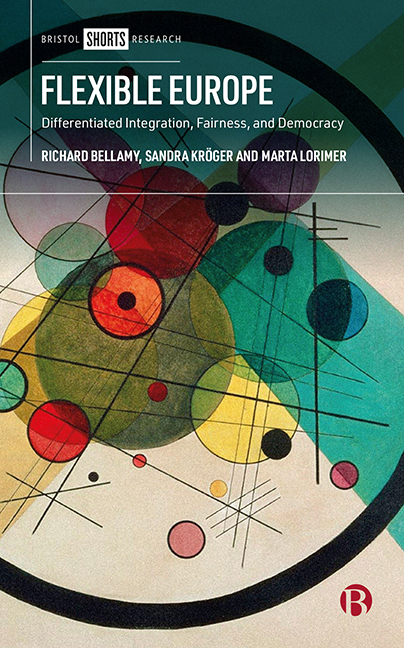Book contents
- Frontmatter
- Contents
- List of Tables
- List of Abbreviations
- About the Authors
- Acknowledgements
- Introduction
- PART I Normative Perspectives on Differentiated Integration
- PART II Political Party Perspectives on Differentiated Integration
- Conclusion
- Appendix A List of Respondents
- Appendix B Interview Questions
- Appendix C Survey Questions
- Notes
- References
- Index
one - Differentiated Integration as a Fair Scheme of Cooperation
Published online by Cambridge University Press: 15 September 2022
- Frontmatter
- Contents
- List of Tables
- List of Abbreviations
- About the Authors
- Acknowledgements
- Introduction
- PART I Normative Perspectives on Differentiated Integration
- PART II Political Party Perspectives on Differentiated Integration
- Conclusion
- Appendix A List of Respondents
- Appendix B Interview Questions
- Appendix C Survey Questions
- Notes
- References
- Index
Summary
The Introduction revealed how DI has pragmatic and normative virtues: it helps European integration to proceed through widening and deepening, and facilitates the accommodation of divergent national capacities and preferences. However, allowing such institutional diversity raises the question of whether DI will yield a form of EU cooperation all participants could find mutually acceptable. This chapter argues that DI plays a role in fairly combining three levels of cooperation within the EU: national cooperation between citizens within each of the member states, international cooperation between member states, and supra-and trans-national cooperation among EU citizens (Sangiovanni, 2013, p 217). DI operates most straightforwardly in rendering international cooperation consistent with different forms of national cooperation. Yet, in so doing it may detract from supra-and trans-national cooperation. This chapter explores these tensions and proposes how they might be resolved.
We consider DI from the perspectives of political justice, or procedural fairness, and social justice, or substantive fairness. If procedural fairness concerns fair participation within, and the legitimate exercise of power by, the political institutions of the EU; substantive fairness concerns the just distribution of social and economic goods, such as income and opportunities. Following Rawls (2001, pp 6, 15), we see impartiality and reciprocity as core norms of both kinds of fairness. We shall argue that while DI can be a source of unfairness, it can also facilitate forms of cooperation consistent with these norms by accommodating diversity. However, Rawls distinguishes international cooperation among state peoples from national cooperation among a state's citizens, with fairness in the former case involving far thinner commitments than in the latter. This distinction proves pertinent to the EU, which has been viewed as both an intergovernmental association of member states (Moravcsik, 1993, p 480), in which states remain ‘masters of the treaty’, enjoying preeminent decisionmaking power within the EU and political legitimacy for their citizens, and a supranational polity in the making, providing individuals with a range of supranational and transnational rights as European citizens (Haas, 1958, p 16), and to some degree shares elements of each (Kröger and Friedrich, 2013). That suggests a possible conflict may arise, whereby DI that seems acceptable from a statist and intergovernmental perspective, to support cooperation at the national level, would be unacceptable from a supranational perspective, focused on fair cooperation among all EU citizens, and vice versa.
- Type
- Chapter
- Information
- Flexible EuropeDifferentiated Integration, Fairness, and Democracy, pp. 27 - 48Publisher: Bristol University PressPrint publication year: 2022

